 Petzlover
Petzlover Belgian Shepherd Dog (Malinois) is originated from Belgium but Jug is originated from United Kingdom. Belgian Shepherd Dog (Malinois) may grow 30 cm / 12 inches higher than Jug. Belgian Shepherd Dog (Malinois) may weigh 27 kg / 60 pounds more than Jug. Belgian Shepherd Dog (Malinois) may live 3 years less than Jug. Belgian Shepherd Dog (Malinois) may have more litter size than Jug. Both Belgian Shepherd Dog (Malinois) and Jug requires Low Maintenance.
Belgian Shepherd Dog (Malinois) is originated from Belgium but Jug is originated from United Kingdom. Belgian Shepherd Dog (Malinois) may grow 30 cm / 12 inches higher than Jug. Belgian Shepherd Dog (Malinois) may weigh 27 kg / 60 pounds more than Jug. Belgian Shepherd Dog (Malinois) may live 3 years less than Jug. Belgian Shepherd Dog (Malinois) may have more litter size than Jug. Both Belgian Shepherd Dog (Malinois) and Jug requires Low Maintenance.
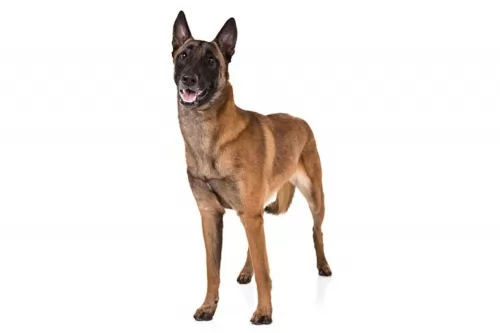 The Belgian Malinois is one of 4 Belgian Shepherd varieties. The dogs were developed- and hail from Belguim. The Malinois has a short, fawn colored coat. The American Kennel Club recognizes that the Malinois is a separate breed from the other 3 varieties. It was in 1892 that Professor Reul wrote the first Belgian Shepherd Dog standard, recognizing 3 varieties – dogs with short coats, dogs with long coats and dogs with rough coats.
The Belgian Malinois is one of 4 Belgian Shepherd varieties. The dogs were developed- and hail from Belguim. The Malinois has a short, fawn colored coat. The American Kennel Club recognizes that the Malinois is a separate breed from the other 3 varieties. It was in 1892 that Professor Reul wrote the first Belgian Shepherd Dog standard, recognizing 3 varieties – dogs with short coats, dogs with long coats and dogs with rough coats.
Today's Malinois goes back to a breeding pair owned by Adrien Janssens. It was in 1885 that he bought a fawn, rough-haired dog, breeding the dog with a short-haired dog named Lise de Laeken. After other breedings, the two dogs were recognized as ancestors of the modern Belgian Shepherd Dogs.
The city of Malines formed a club for the promotion of these fawn short hairs and the name Malinois became synonymous with them. In March 1992, the American Belgian Malinois Club received AKC parent club status.
 The Jug is a crossbreed – a mix of a pug and a Jack Russell Terrier and they were bred in England with the idea to keep the basic features of a pug but just with a longer nose.
The Jug is a crossbreed – a mix of a pug and a Jack Russell Terrier and they were bred in England with the idea to keep the basic features of a pug but just with a longer nose.
Details on the origin of the dog are not altogether clear but the dog was developed so that it would reduce the breathing problems that pugs and other flat-faced breeds are known for.
This isn’t an old breed and development started around the 1960s. It is one of the most recent breeds to be registered by the American Canine Hybrid Club.
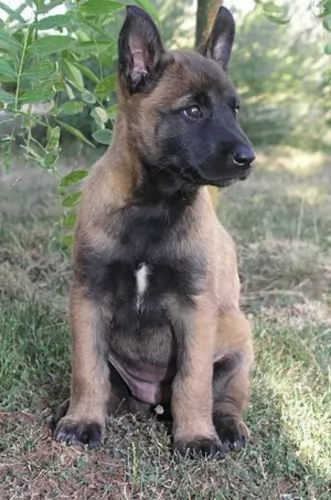 The Malinois is a medium-size Belgian shepherd dog. People sometimes mistake them for the German Shepherd as they are fairly similar to look at. The Malinois however is a smaller, lighter boned dog with naturally upright ears and a black-masked face. He is shorthaired and fawn-colored with black tips on the hairs, although other colors are brown or red too. He is an intelligent and active dog, always having been used for herding-, police- and rescue work.
The Malinois is a medium-size Belgian shepherd dog. People sometimes mistake them for the German Shepherd as they are fairly similar to look at. The Malinois however is a smaller, lighter boned dog with naturally upright ears and a black-masked face. He is shorthaired and fawn-colored with black tips on the hairs, although other colors are brown or red too. He is an intelligent and active dog, always having been used for herding-, police- and rescue work.
You’ll find the Malinois somewhat unpredictable as some are friendly and confident while other can be shy and withdrawn around strangers. This is a dog who loves to be around his human family, but to bring out the best in him, training and socialization classes will be necessary. Well-socialized Malinois are always good with children and other pets, more so if they’ve been raised with them.
 The Jug will usually end up having a round head with the typical short muzzle of the Pug. He may be somewhat lighter in build than the Pug, taking more after the Jack Russell in this regard.
The Jug will usually end up having a round head with the typical short muzzle of the Pug. He may be somewhat lighter in build than the Pug, taking more after the Jack Russell in this regard.
The way the dog turns out will depend on which dog the puppy takes after. He is a small breed dog standing at between 25 to 36cm at the withers and weighing 5 to 7kg.
When it comes to coat color you'll find they can vary between fawn, black, apricot and sometimes a blend of two colors. While pugs come with smoothish coats, the Jack Russell can either have a smooth or rough coat and your Jug could inherit either a smooth or rough coat.
He could inherit the Pug’s flat, somewhat wrinkled face while others may have a slightly longer muzzle. The eyes are large and the ears are floppy. The legs are short and the tail will no doubt be left long these days and be slightly curled.
The tenacious, fearless, intelligent nature of the Jack Russell Terrier mixed with the entertaining, amicable nature of the pug has brought out the Jug dog with a whole lot of excellent qualities of both dog breeds.
They are loving, loyal dogs and when they are trained and socialized they get on particularly well with both pets and children in the the home. He is intelligent and will be able to learn some simple commands such as sit, stay and lie down.
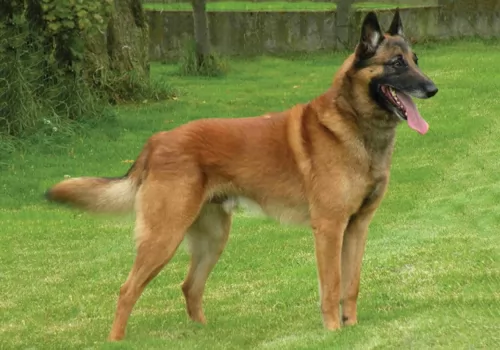 The Belgian Malinois makes a wonderful guard dog and he works hard to ensure that his human family, whom he adores, are well protected under his watch. They’re such intelligent dogs too that you may feel inclined to pass over some of your chores to him.
The Belgian Malinois makes a wonderful guard dog and he works hard to ensure that his human family, whom he adores, are well protected under his watch. They’re such intelligent dogs too that you may feel inclined to pass over some of your chores to him.
He responds well to training, and to get the best from this breed, start with training and socialization as soon as you bring your puppy home.
Socialization is excellent as it introduces your puppy to different people, animals as well as situations.
He is an adaptable dog and can live in an apartment if he is well exercised. He can be your devoted and loyal friend for a good number of years but you will have to do your part in providing him with the best care possible.
 Jugs are wonderful little dogs and they make a good choice for first time dog owners as they don’t come with any difficult characteristics.
Jugs are wonderful little dogs and they make a good choice for first time dog owners as they don’t come with any difficult characteristics.
They’re playful, intelligent, energetic and amicable and just love to please their human family. Because of his small size, he is also an adaptable dog, being able to settle down in the city or the country, as long as he is given enough mental- and physical exercise to prevent boredom and frustration.
Provide the right environment for your Jug and you’ve got an awesome canine friend for life.
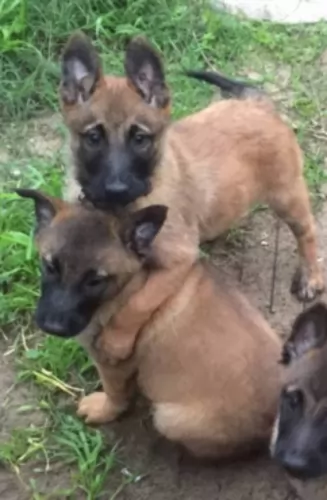 Belgian Malinois are generally healthy dogs. However every dog, regardless of breed, can pick up illnesses, and it is always wise to be aware of some of the diseases your Malinois might face.
Belgian Malinois are generally healthy dogs. However every dog, regardless of breed, can pick up illnesses, and it is always wise to be aware of some of the diseases your Malinois might face.
An inherited condition where the thigh bone doesn't fit properly into the hip joint. As the dog ages, arthritis can develop.
A degenerative eye disorder that can lead to blindness.
Brush his teeth at least 2 or 3 times a week to remove tartar build-up. Too much plague leads to inflamed gums, bad breath, pus inside the mouth and even loss of teeth.
 Your jaunty little Jug can live anything from 12 to 20 years when looked after well.
Your jaunty little Jug can live anything from 12 to 20 years when looked after well.
Just like with any other dog however, he can become ill, and then you will need to get him to the vet as soon as possible. Allergies, breathing problems, bloat, primary lens luxation, skin disorders, deafness, cardiomyopathy and obesity are just some of the common dog diseases that your Jug might have to deal with.
Because one of the dogs used in the development of the Jug is a Pug, as a brachycephalic breed, they could suffer with breathing problems. The Jug which inherits the shorter muzzles can suffer from a condition known as Brachycephalic Airway Syndrome.
Some Jugs can have the large, protruding or bulbous eyes of the Pug. With an eye problem known as Entropion, the lid of the eye can turn inward so that the eyelash pushes into the eyeball, causing lots of redness, discharge and irritation. This can lead to an infection in the eye. You may notice your Jug constantly pawing at his eye.
This can be a real problem for your Jug and the extra weight will put additional strain on the dog’s heart and other organs and also affect his overall health and wellbeing.
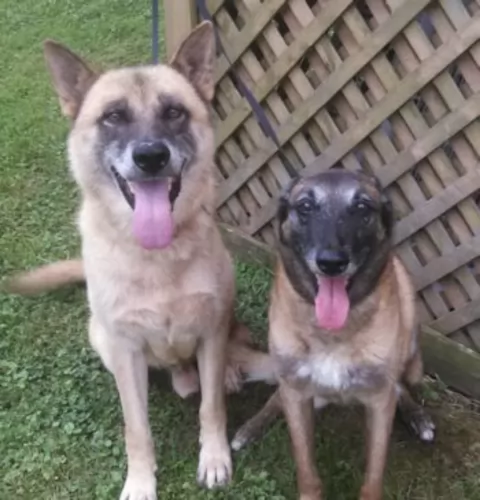 Because the Malinois is a constant shedder, with a couple of heavy shedding periods during the year, you’ll need to be conscientious with his grooming and brush him at least twice a week to get rid of loose hairs and to give his thick coat a glossy, healthy look to it.
Because the Malinois is a constant shedder, with a couple of heavy shedding periods during the year, you’ll need to be conscientious with his grooming and brush him at least twice a week to get rid of loose hairs and to give his thick coat a glossy, healthy look to it.
Because of their high energy, Malinois aren’t recommended for couch-potato type owners. It will be cruel to buy such a dog and to leave him to waste away with boredom and frustration in your back yard. He’ll want lots of rough and tumble, ball games, runs in the park or in the country and long walks.
Belgian Shepherd Malinois puppies are vulnerable when they’re tiny, and it would be wise to speak to your vet about superb nutrition to build up a puppy’s immune system.
An excellent way to ensure the health of your growing Malinois is to give him a home prepared meals along with commercially manufactured food recommended by your vet. You can’t just put a bowl of commercially manufactured dog food in front of him day after day month after month.
Apart from what your vet recommends, give him some brown rice, some cooked vegetables and some raw meat. Raw meat will ensure he can fight of skin infections. The age of the dog, emotional state and environmental influences can all play a role in skin diseases with dogs, but by ensuring some raw meat in his diet, the immune system is strengthened and skin disorders are eliminated. Always ensure a steady supply of fresh water.
 Small he may be, but the Jug is an energetic little dog who will require exercising to keep him content. Toys to chew on are good and you can take him for walks too. Throw a ball for him or let him tug on a rope.
Small he may be, but the Jug is an energetic little dog who will require exercising to keep him content. Toys to chew on are good and you can take him for walks too. Throw a ball for him or let him tug on a rope.
To keep your little Jug healthy and happy, you want to be sure that his diet is made up of a balanced mix of vitamins and minerals. If you feed him a commercially manufactured food, make sure that its one of the best ones free of toxic colorants and preservatives.
Check on the packaging for portion sizes for your pet. Give him some home-made food too such as cooked chicken, rice, pasta and vegetables and try to also include some raw meat mixed into his kibble from time to time. Fresh, cool water should always be included day and night.
With healthy food, your Jug can make it to 17, 18, 19 or 20 years of age even. Remember that anytime you get a pet, you can check with your veterinarian for dietary recommendations.
The Jug can shed quite a bit, particularly if he inherited more of the Pug coat. Make sure you brush his coat at least twice a week to rid him of loose hairs. Brushing also strengthens the bond between you and your pet.
Recognize the signs of an ear problem. These can be redness or swelling, ear scratching, head shaking or ear discharge.
To keep his teeth and gums healthy you can provide him with safe, appropriate toys to chew on as well as dental chews recommended by your vet.
Check your dog’s eye health. Signs of an eye problem are eye discharge and redness. Take your pet to the vet as soon as possible and try and remove hair around the eye that could be causing irritation.